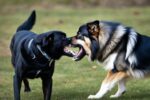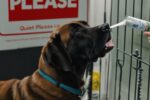Managing Nighttime Restlessness in Dogs

Nighttime restlessness can be a challenge for both dogs and their owners. It can disrupt sleep and leave everyone feeling exhausted. Understanding the causes of this behavior and implementing effective management strategies are essential for a peaceful night’s sleep.
Nighttime restlessness in dogs can manifest in various behaviors such as pacing, panting, whining, and overall restlessness. It can be caused by factors such as anxiety, stress, pain, and even age-related changes. Addressing these underlying causes is key to managing nighttime restlessness.
By implementing sleep training techniques, pet owners can help their dogs develop healthy nighttime behaviors and establish a routine that promotes restful sleep. This may involve creating a calm sleep environment, providing mental and physical stimulation during the day, and considering calming aids if necessary.
Managing nighttime restlessness not only improves the dog’s well-being but also ensures a better quality of sleep for the entire household. With the right approach and personalized strategies, dogs can experience more peaceful nights, and owners can enjoy the benefits of a well-rested and happy companion.
Understanding the Causes of Nighttime Restlessness
There can be several reasons why dogs experience restlessness at night. These include anxiety and stress, especially in senior dogs. Canine Cognitive Dysfunction (CCD), often likened to doggy Alzheimer’s, can also lead to nighttime restlessness. Additionally, pain and discomfort, whether due to arthritis or other health conditions, can contribute to restlessness in dogs at night.
Sleep disturbances in dogs can be caused by various factors, and understanding these causes is essential in effectively managing nighttime restlessness. By addressing the underlying issues, pet owners can improve their dogs’ quality of sleep and overall well-being.
Anxiety and Stress
Anxiety and stress can significantly impact a dog’s behavior, especially during nighttime. Senior dogs, in particular, may experience increased anxiety at night due to various factors such as cognitive decline, changes in routine, or separation anxiety. These feelings of stress and unease can manifest as restlessness, pacing, whining, or excessive panting.
Canine Cognitive Dysfunction (CCD)
Canine Cognitive Dysfunction (CCD) is a condition commonly seen in aging dogs, similar to Alzheimer’s disease in humans. This cognitive decline can cause confusion, disorientation, and changes in sleep patterns. Dogs with CCD may exhibit restlessness and agitation, leading to disrupted sleep at night.
Pain and Discomfort
Pain and discomfort can significantly impact a dog’s ability to sleep peacefully. Dogs suffering from conditions like arthritis, hip dysplasia, or other health issues may experience increased restlessness as a result of the pain they are experiencing. This discomfort can lead to frequent waking up, difficulty settling, and changes in sleep patterns.
Understanding the underlying causes of nighttime restlessness in dogs is the first step in addressing this issue. By identifying whether anxiety, CCD, pain, or other factors are contributing to the restlessness, pet owners can work with their veterinarians to develop a suitable management plan. A thorough veterinary examination and consultation will provide valuable insights to guide the treatment and ensure a more restful night’s sleep for both dogs and their owners.
Stay tuned for Section 3, where we will delve into the diagnosis and treatment options for nighttime restlessness in dogs.
Diagnosing and Treating Nighttime Restlessness
A proper diagnosis is essential in managing nighttime restlessness in dogs. Veterinary examinations, including a thorough history and physical exam, are crucial in determining the underlying cause of restlessness. This may involve running lab tests, such as bloodwork and urinalysis, to gather more information.
During the veterinary examination, the veterinarian will take into account the dog’s medical history, including any previous incidents of anxiety or restlessness. They will also perform a physical examination to assess the dog’s overall health and look for any signs of discomfort or pain.
If necessary, additional lab tests may be recommended to further investigate the potential causes of nighttime restlessness. Bloodwork can provide valuable insights into the dog’s internal organ function, hormone levels, and potential underlying health issues. Urinalysis can help detect any urinary tract infections or other urinary abnormalities.
Once a diagnosis is made based on the veterinary examination and lab test results, treatment options can be discussed. The appropriate treatment will depend on the underlying cause of the restlessness. In some cases, medication may be prescribed to alleviate anxiety or manage pain. Behavior modification techniques, such as desensitization and counterconditioning, may be recommended for dogs with anxiety-related restlessness.
A comprehensive approach to treating nighttime restlessness may involve:
- Medication: Anti-anxiety medications or pain relievers may be prescribed to address the underlying causes of restlessness.
- Behavior modification: Training techniques and positive reinforcement can help dogs develop healthier behaviors and cope with anxiety.
- Environmental management: Creating a calm and comforting sleep environment can significantly reduce restlessness. This may include providing a cozy bed, minimizing noise, and using soothing sounds or aromatherapy.
- Mental and physical stimulation: Engaging the dog in regular exercise and mental stimulation can tire them out, leading to a better night’s sleep.
- Nutritional changes: In some cases, dietary modifications or supplements may be recommended to support the dog’s overall health and well-being.
Collaborating closely with a veterinarian ensures a tailored approach to addressing nighttime restlessness in dogs. By implementing an appropriate treatment plan, pet owners can help their dogs find relief and enjoy restful nights.
Common Lab Tests for Diagnosing Nighttime Restlessness
| Lab Test | Information Obtained |
|---|---|
| Bloodwork | Evaluates organ function, hormone levels, and possible underlying health issues |
| Urinalysis | Detects urinary tract infections and urinary abnormalities |
Managing Nighttime Restlessness at Home
When it comes to managing nighttime restlessness in dogs, there are several strategies that can be implemented at home to provide comfort and create a calm sleep environment. These strategies focus on both the physical and mental well-being of the dog, aiming to reduce restlessness and promote a restful night’s sleep.
Providing Comfort for Restless Dogs
One of the first steps in managing nighttime restlessness is ensuring that your dog is comfortable. Investing in a cozy and supportive bed can make a significant difference in their sleep quality. Look for beds that provide ample cushioning and support for their joints, especially for senior dogs or those with arthritis.
In addition to a comfortable bed, soothing sounds can also help calm restless dogs. Consider using white noise machines or calming music specifically designed for dogs. These gentle sounds can drown out any external noise and create a relaxing atmosphere that promotes better sleep.
Creating a Calm Sleep Environment
The sleep environment plays a crucial role in managing nighttime restlessness. Minimizing noise and disruptions can help create a serene atmosphere that encourages deep sleep. Consider using blackout curtains to block out any excessive light sources, ensuring a dark and tranquil space for your dog to sleep.
Temperature is another factor to consider when creating a calm sleep environment. Dogs are sensitive to fluctuations in temperature, so maintaining a comfortable and consistent room temperature can contribute to better sleep quality. Ensure the room is neither too hot nor too cold, aiming for a temperature that is suitable for your dog’s breed and size.
Mental and Physical Stimulation
Dogs, especially those with excess energy, may experience restlessness if they haven’t had enough mental and physical stimulation during the day. Engaging in regular exercise and play sessions can help tire dogs out and promote better relaxation at night. Incorporate activities that challenge their minds, such as puzzle toys or training exercises, to stimulate cognitive function and reduce anxiety.
Calming Aids
In some cases, providing comfort and creating a calm sleep environment may not be sufficient to manage nighttime restlessness. This is where calming aids can be beneficial. Calming supplements, such as chamomile or melatonin, can help promote relaxation and reduce anxiety in dogs. Additionally, there are sprays available that contain pheromones, which mimic the natural calming scents of dogs and can soothe them in stressful situations.

Implementing these strategies in managing nighttime restlessness can lead to more peaceful nights for both dogs and their owners. By providing comfort, creating a calm sleep environment, ensuring mental and physical stimulation, and incorporating calming aids when needed, dog owners can help their pets relax and enjoy restful sleep. These approaches, combined with professional guidance and personalized care, contribute to a happier, healthier, and well-rested dog.
Breed-Specific Factors and Age-Related Restlessness
Some dog breeds may be more prone to anxiety and restlessness at night due to their genetic predispositions. Breeds known for their high energy levels or working backgrounds, such as Border Collies and German Shepherds, may be more susceptible to nighttime restlessness.
Additionally, senior dogs may experience age-related restlessness, particularly due to conditions like Canine Cognitive Dysfunction (CCD). Canine dementia, also known as CCD, can cause confusion, disorientation, and changes in behavior, including nighttime restlessness.
Understanding these breed-specific factors and age-related changes can help dog owners better manage their pets’ restlessness at night.

| Breed | Common Traits |
|---|---|
| Border Collie | Highly energetic, intelligent, and work-driven |
| German Shepherd | Loyal, protective, and active |
Age-Related Restlessness in Senior Dogs
As dogs age, their physical and cognitive abilities may decline, leading to restlessness at night. Senior dogs may experience pain or discomfort from arthritis or other health conditions, making it difficult for them to settle down and sleep peacefully.
In addition to physical factors, senior dogs may also develop Canine Cognitive Dysfunction (CCD), a condition similar to dementia in humans. CCD can cause memory loss, confusion, and anxiety, contributing to nighttime restlessness.
It is essential for dog owners to provide their senior pets with a comfortable sleep environment and address any underlying health issues or cognitive changes that may be causing restlessness.
Conclusion
Managing nighttime restlessness in dogs is essential for promoting their well-being and ensuring owners can enjoy peaceful sleep. By addressing the underlying causes of restlessness, diagnosing and treating any related conditions, creating a comfortable sleep environment, and considering breed-specific and age-related factors, dog owners can help their pets achieve restful nights and improved overall health.
Understanding the root causes of nighttime restlessness is the first step in effective management. Whether it’s anxiety, pain, or cognitive dysfunction, identifying and addressing these factors can significantly reduce restlessness in dogs. Consulting with a veterinarian is crucial for obtaining an accurate diagnosis and developing an appropriate treatment plan, which may include medications, behavior modification techniques, or other interventions.
Creating a calm sleep environment for dogs is also vital. Providing a cozy bed, minimizing noise, and maintaining a comfortable temperature can contribute to a more peaceful sleep experience. Additionally, mental and physical stimulation during the day, such as regular exercise and engaging playtime, can help tire dogs out and promote restfulness at night. Calming aids, like supplements or sprays, can also be beneficial in helping dogs relax and achieve a more restful sleep.
Consideration of breed-specific traits and age-related changes is essential in managing nighttime restlessness in dogs. Certain breeds, known for their high energy levels or working backgrounds, may require additional attention and stimulation to prevent restlessness at night. Likewise, senior dogs may experience age-related restlessness due to conditions like canine cognitive dysfunction. Recognizing these factors can guide owners in tailoring their approach to effectively address their pets’ specific needs.
Ultimately, by implementing expert strategies and personalized approaches, dog owners can help ensure their pets have restful nights and maintain their overall well-being. Managing nighttime restlessness not only benefits the dog’s health but also improves the owner’s quality of sleep, fostering a harmonious relationship and enhancing the bond with their beloved canine companion.
FAQ
What are the common behaviors associated with nighttime restlessness in dogs?
Common behaviors associated with nighttime restlessness in dogs include pacing, panting, whining, and general restlessness.
What are the possible causes of nighttime restlessness in dogs?
The possible causes of nighttime restlessness in dogs can include anxiety and stress, especially in senior dogs, Canine Cognitive Dysfunction (CCD), and pain or discomfort due to health conditions.
How is nighttime restlessness in dogs diagnosed and treated?
Nighttime restlessness in dogs is diagnosed through veterinary examinations, including a thorough history and physical exam, and may involve running lab tests such as bloodwork and urinalysis. Treatment options may include medication, behavior modification, or other interventions.
What strategies can dog owners implement to manage nighttime restlessness at home?
Dog owners can manage nighttime restlessness at home by providing comfort with cozy beds and soothing sounds, creating a calm sleep environment, engaging in mental and physical stimulation during the day, and using calming aids such as supplements or sprays.
Are certain dog breeds more prone to nighttime restlessness?
Some dog breeds known for high energy levels or working backgrounds, such as Border Collies and German Shepherds, may be more susceptible to nighttime restlessness. Additionally, senior dogs may experience age-related restlessness, particularly due to conditions like Canine Cognitive Dysfunction (CCD).





